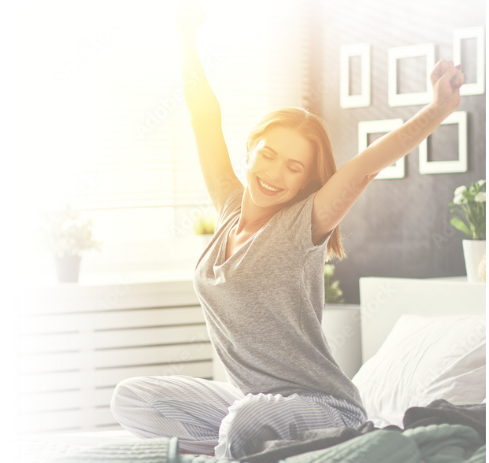There’s nothing better than waking up refreshed after a good night’s sleep. It’s not only a great way to start the day, but it’s also important to boost your body’s immune function, fight disease and illness, optimize our performance, and keep our emotions in check.

Dr. Katie Sharkey
The Brown Medicine Insider caught up with nationally renowned sleep expert, Dr. Katie Sharkey,
a physician in Brown Medicine’s Division of Pulmonary, Critical Care and Sleep Medicine.
She is a clinician, researcher and associate professor in the Departments of Medicine and Psychiatry
and Human Behavior at the Alpert Medical School of Brown University, and associate dean for Gender Equity at Brown.
Here is what she has to say:
 Q: What does it mean to practice good “sleep hygiene”?
Q: What does it mean to practice good “sleep hygiene”?
A: It’s basically a set of habits you can use to optimize sleep quality and keep your sleep on schedule. This includes going to bed and waking up around the same time every day and not spending time in bed when you are not sleeping. In addition, people should aim to avoid common disruptions like bright light at night, and noise and eating or drinking right before bed – especially alcohol and caffeine. I also advise people not to snuggle with their smartphones!
Q: How much sleep does a person need?
A: On average, adults require 7-8 hours; adolescents between 8-10; school-aged children 9-11 hours; and babies up to 18 hours. One way to tell that you are not getting enough sleep is if you notice that you can sleep in much later on days off than on work or school days. That means your body is trying to make up for insufficient sleep. If you have a late night here and there, you should be able to handle that if your sleep habits are good most of the time.
Q: What are circadian rhythms?
A: Circadian rhythms are the 24-hour cycles produced by your body’s internal biological clock. With regards to sleep, this clock helps control your daily schedule for sleep and waking, and it’s regulated by the daily light-dark cycle. Most people know if they are a morning person or night owl by when they fall asleep and wake up naturally without an alarm clock. If circadian rhythms are disrupted, for example, due to jet lag or shift work, shutting out daylight when you need to sleep and shifting your mealtimes can help you readjust.
Q: What is melatonin and should someone take these supplements?
A: The human body naturally produces melatonin. It’s secreted by the brain’s pineal gland in response to darkness and is linked to the regulation of circadian rhythms. Melatonin can be used as a sleep aid, especially for situations that involve circadian disruption like jet lag and shift work. Speak with your healthcare provider before using melatonin because it must be taken at the right time to be beneficial.
Q: What’s the best way to overcome insomnia?
A: There are many causes of sleep difficulties. From stress and anxiety to pain and illness, the reasons are varied but it is helpful to determine what is causing the sleeplessness. Insomnia can even occur as a side effect of some medications. While the contributing factors are identified and managed, engaging in a specific short-term therapy called cognitive and behavioral therapy for insomnia (CBT-I) can get people back on track. And, of course, practicing good sleep hygiene is a good way to prevent insomnia.
Q: Are naps OK?
A: When a child gets cranky, we put them down for a nap. But as we age, adults who get cranky seem to forget the benefits of napping! The National Sleep Foundation estimates about one-third of adults in the U.S. get a daily nap. Short naps (20-30 minutes or shorter “power” naps) can help improve your energy, refresh your brain’s alertness, and restore emotional balance and good mood. Daytime naps should not be so long as to interfere with getting a good night’s sleep. Listen to your body and nap if you can, or simply close your eyes to meditate and breathe deeply. If you are excessively sleepy during the day, you may have a sleep disorder such as narcolepsy or sleep apnea. Whenever you notice a change in your sleep, wake up tired after a long night’s sleep, or experience daytime alertness difficulties, it’s time to speak with your doctor.
Q: Do you have any tips for making the bedroom better for sleep?
A: Your bedroom should be very relaxing and a welcome, quiet oasis. Get rid of all electronics, use light-blocking materials for window shades, and find ways to keep the temperature cool for the most restful sleep possible. If you have difficulties with coughing or nasal congestion at night, it might be time for new pillows and a mattress cover. Bedding can accumulate allergens and exacerbate breathing issues at night.
